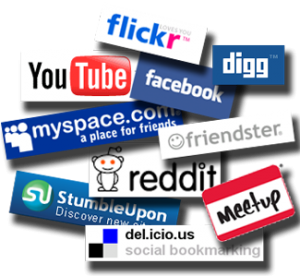Over the past ten years, social media has become one of the biggest modes of interaction between the public, organisations and businesses all over the world.
Facebook is currently the biggest social networking site in the world, with an estimated 800 million users, with half of them logged in on any given day.
The public uses social networking sites for a majority of reasons; to socialise with friends, meet new people and even large businesses are now using social networks to promote themselves and their business.
This is having a huge impact on our day to day lives and also the information we consume. A recent study has shown that 48% of youths now get their news from Facebook. This can be seen as a positive though, with social networking sites enabling individuals to keep up with current news and trends.
But is being a member of such sites also having negative effects? Is social media taking over our lives? And at what cost are we simplifying our lives by communicating through social media?
Statistics show that a shocking 57% of people using social networking sites talk to more people online than in real life. People are spending more time at home on Facebook and Twitter, seeing what is going on around them rather than actually getting up and doing something productive with their day.
A whopping 48% of 18-34 year olds check Facebook when they wake up, and 28% of these doing so before they have even got out of bed. Being a student at university, social networking is a huge part of the student life. With university events, socials and the monthly bar crawls being broadcasted all over social networking sites, it is inevitable that the majority of us will be connected to a network such as Facebook at any given time of the day.
The progression of technology in mobile phones is a huge factor in the statistics given, as we are now able to access sites such as Facebook and Twitter whilst out and about, instead of having to be glued to a computer screen.
The scope of social media is now being widened as large businesses are increasingly using websites such as Facebook and Twitter to publicise their brand. For example CNN, BBC and ABC News are now broadcasting from these sites.
A CareerBuilder Survey found that 45% of employers are now using social networking sites to screen potential employees. They scan social networks to look for any negative feedback surrounding them. From this, we are able to see that something that started out as a tool for people to communicate ideas and prospects with one another, has now become a global tool for all kinds of people and businesses to use in a variety of ways.
Educational groups have also started making use of these sites. Students are now joining online ‘Facebook Groups’ to interact with other students on the same course to discuss current assignments, ask questions and to relay ideas.
Even lecturers and tutors are even joining these groups in order to communicate with their students for a variety of reasons, such as help, updates on lecture or assignment tasks. This is a positive aspect of social networking sites, as we are able to communicate ideas with one another and meet other students with the same interests as you whilst studying at university.
The government and political leaders are now realising that they can benefit from the use of social media. They are able to reach out to people from all walks of life with whom they would not have been able to reach out to otherwise.
They are only able to do this due to the fact that so many people are using social media. The fact they are able to do this shows how reliant society has become upon the use and involvement of social media sites on a day to day basis. Facebook can create a great social tool, but at the same time it can be dangerous and addictive, and is taking over our day to day lives.
Social media has both good and bad aspects to it. It is encouraging younger people to interact with news, politics and issues beyond what they might encounter in their day to day lives. However, there is a tipping point where people do spend too long online and are influenced the wrong way when they take on false information. Yes, social media has taken over our lives, but it is the way we use it that determines whether that is a good or bad thing.


UWE Society Promotion – The Failure of the Refreshers Model
CORBYN’S COMING
Primer: Politics at UWE
The cost of living is hitting students hardest
5 thoughts on “Is Social Media Taking Over Our Lives?”